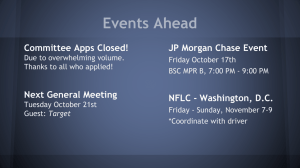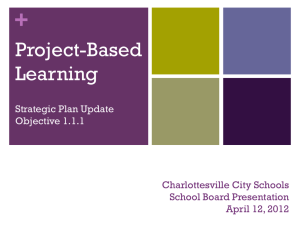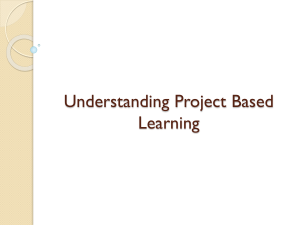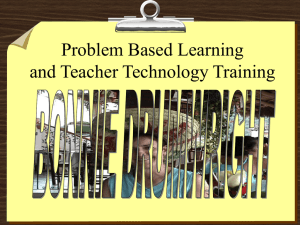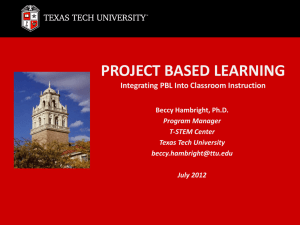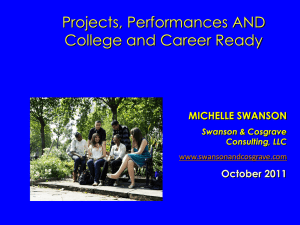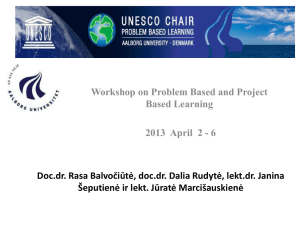Powerpoint - Department of Physics and Astronomy
advertisement
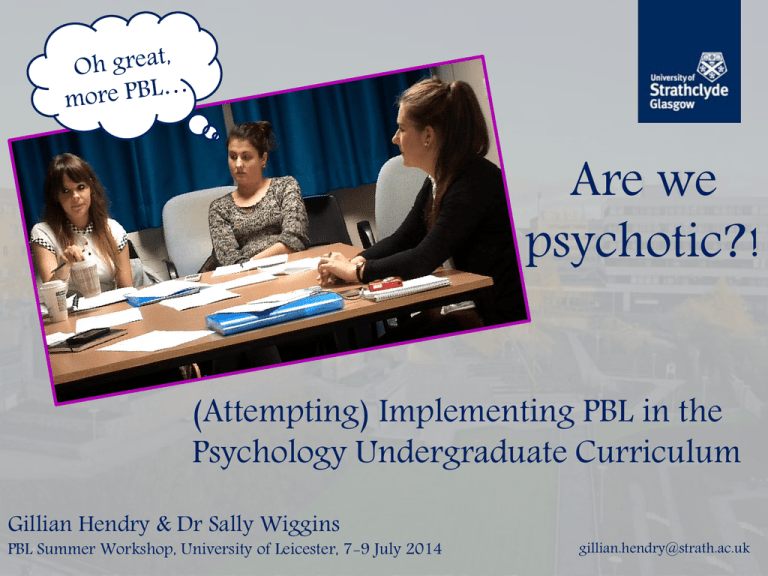
Are we psychotic?! (Attempting) Implementing PBL in the Psychology Undergraduate Curriculum Gillian Hendry & Dr Sally Wiggins PBL Summer Workshop, University of Leicester, 7-9 July 2014 gillian.hendry@strath.ac.uk About us Dr Sally Wiggins is a senior lecturer, specialising in Social and Discursive Psychology, and has been using PBL in teaching for around 7 years. To date, she has received two grants to develop PBL within the Psychology curriculum at Strathclyde. I am a 2nd-year PhD student, funded by the HEA Doctoral Programme, looking at student interaction in PBL (stay tuned; more on this later!). I was the research assistant employed for the latter project, and also have recent experience (2010) of being a student in a PBL-taught class. @StrathUni_Gill @drsallywiggins gillian.hendry@strath.ac.uk The project £25,938 awarded for 18-month project (beginning May 2011), implementing PBL into the Psychology undergraduate curriculum We couldn’t shift to PBL entirely, but aimed to help encourage student autonomy and engagement in learning PBL in psychology relatively rare (Abertay, Leeds, Linköping); three years later, becoming more prevalent Project based upon previous successful implementation of PBL in 4th year ‘Qualitative Methodologies in Psychology’ class (completely PBL-run for full semester) @StrathUni_Gill @drsallywiggins gillian.hendry@strath.ac.uk The materials The project aimed to design and implement PBL into at least one class in each year of the Psychology programme Things don’t always go to plan! Scope of project was scaled down to accommodate restructuring of degree – instead, PBL components were introduced within a class The final materials developed were as follows: 1st year: ‘Wall of Fame’ problem (basic psychology class) 3rd year*: ‘MI5’ problem (Individual Differences class) 3rd year: ‘Panoramic Productions’ problem (Social Psychology class) 4th year: ‘App-y Days’ and ‘Anarchy in the UEC’ problems (CHIP) *I’ve not made a typo – no second year classes were converted to PBL! @StrathUni_Gill @drsallywiggins gillian.hendry@strath.ac.uk Wall of Fame (1 st year Psychology) “You are a team of historians opening a new ‘History of Psychology’ museum, and have been allocated the period 1960-1970. What should be included?” - Sessions took place over 3 x 1-hour sessions - Were expected to produce one slide of PowerPoint - In final session, class leader presented each of the slides one by one, class voted - 1st year students, new to PBL and to psychology, so problem seemed apt in that it gave an overview of psychological research - 300+ in class, groups of 10 in tiered lecture theatre - GTAs as facilitators @StrathUni_Gill @drsallywiggins gillian.hendry@strath.ac.uk The Milgram study, 1961; designed to measure people’s willingness to obey a higher authority, even if that comes into conflict with their conscience (superego) Study of roots of aggression and violence. Link to Nazism (holocaust), and Vietnam and Koran Wars; was there a shared perception of moral conduct amongst participants? Anti-war movement/ Preoccupation with war Could link to memory loss and damage from war veterans Atkinson’s multi-store model of memory, 1968 explains how memory 1960 – 1970: Age of political and social instability and change. Turning point in politics, international relations, culture, science. Sense of going towards new, modern, shocking world. Growing interest in behaviour. Psychology studies become “fashionable”. works violent scenarios are more likely to act in a physically aggressive way Exploration of new ideologies; communism, feminism, Hippies, Sexual Revolution… Led to Interest in mental processes Bandura’s “Bobo doll” experiment, 1961 and 1963; found that children exposed to Effects of maternal separation and institutionalisation. Cognitive Psychology; Exploration of mental processes like thought, perception, memory, learning. Cognitive Therapy seeks to help the patient by identifying and changing dysfunctional mental processes. Founded by Aaron T. Beck. Star = unethical today; part of the search for shocking, modern change during 1960s Research done at this period led to today’s knowledge about child psychology and education and could be seen as the cause of modern moral codes such as the Nuremberg Principles, the law of war, and the lower percentage of violent TV shown during the day. Harlow and the rhesus monkeys, between 1957 and 1963; baby monkeys removed from mothers and “brought up” by surrogate mother replacements made of wire or wire and cloth. Partial and total isolation. Concludes importance of primary care giver in infants. MI5 (3rd year Individual Differences) @StrathUni_Gill @drsallywiggins gillian.hendry@strath.ac.uk MI5 (3 rd year Individual Differences) Instead of 5 x 1-hour lectures, student groups were given the same amount of time to produce a psychometric test No previous knowledge of psychometric testing, so had to find out firstly, how to construct a test (Likert scales, reliability, validity, scoring), and secondly, what would be an appropriate trait to test for the personality type of someone wanting to work at MI5 - Groups of 5/ 6/ 7, 3rd year students - Tiered lecture theatre, but break-out rooms also - Class size roughly 100 students @StrathUni_Gill @drsallywiggins gillian.hendry@strath.ac.uk App-y Days (4th year CHIP) @StrathUni_Gill @drsallywiggins gillian.hendry@strath.ac.uk App-y Days (4 th year CHIP) Student groups to develop an app to help someone with schizophrenia, Asperger's syndrome or Alzheimer’s disease in an aspect of their every day life Groups don’t need to know technical aspect, but should focus on psychological research into chosen condition, and design an app drawing on such research - 4th (final) year students, groups of 4/ 5 - 3 x 1-hour sessions - GTA facilitators @StrathUni_Gill @drsallywiggins gillian.hendry@strath.ac.uk Initial Evaluation Data was collected via questionnaires, focus groups, feedback via assignments Basic feedback (quantifying responses) measured favourite aspects of PBL, what could be changed, study practices etc. Basic statistical analysis of the Learning Process Questionnaire (Kember et al., 2004) revealed no significant difference in approaches to learning (deep/ surface), before and after partaking in PBL Focus groups/ assignment feedback revealed students had both positive and negative views of PBL @StrathUni_Gill @drsallywiggins gillian.hendry@strath.ac.uk Negatives - Project was scaled down (from whole, 12 week classes) to much shorter PBL components - Not all years got involved (no PBL in second year, due to staff resistance) - PRACTICALITIES (room bookings, lack of access to computers, class sizes) - Gripes about assessment Why should she get the same grade as me when she never put the work in?! @StrathUni_Gill @drsallywiggins gillian.hendry@strath.ac.uk Negatives “It was also difficult to hear other members of the team due to the room we were in while working as a team” “it was hard to combine all of the information while pleasing all team members” “some members of the team didn’t perhaps contribute as much” @StrathUni_Gill @drsallywiggins “because it was not graded we did not feel as though it was important as the other work we had to complete at the same time” gillian.hendry@strath.ac.uk Positives - (Many) Students found materials fun and interesting - Appreciated the change from standard lecture format - Enjoyed ‘real world-ness’ of problems - Recognised benefits of self-centred teaching, as opposed to being taught - Enjoyed the face-to-face contact with peers LOL this is so much fun! @StrathUni_Gill @drsallywiggins gillian.hendry@strath.ac.uk Positives “Although initially it seems as though all of our prior work was a waste of time, we came to realise it was in actual fact beneficial” “I found that it was good to have different perspectives and I felt like we kept each other motivated” “I feel as a whole we worked well together and the sessions have definitely benefited my overall learning” @StrathUni_Gill @drsallywiggins “Problem based learning is, in my opinion, a very appropriate method of improving in group co-operation and introduces an extremely fun oriented environment” gillian.hendry@strath.ac.uk Future plans… Currently, unfortunately, we are back to square one. Although some of the PBL components carried into the following year, in academic year 2013/ 2014, all of them were dropped, due to factors mentioned previously However, my PhD is looking at student interaction in PBL, so if we can understand more about the intricacies of what actually happens within the group setting, we will be better placed to support effective PBL implementation Support teaching staff ‘afraid of the unknown’, time to develop materials, reassurance from other Psychology departments that it IS possible @StrathUni_Gill @drsallywiggins gillian.hendry@strath.ac.uk So, are we psychotic for attempting this?! @StrathUni_Gill @drsallywiggins gillian.hendry@strath.ac.uk Acknowledgements University of Strathclyde Education Excellence Fund for supporting the project Staff and students (both willing and unwilling!) Thank you for listening! Sally for paying me for seven months to have fun creating the materials! @StrathUni_Gill @drsallywiggins gillian.hendry@strath.ac.uk
